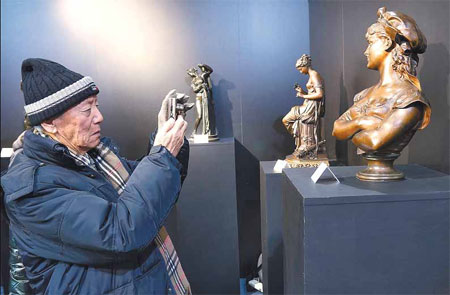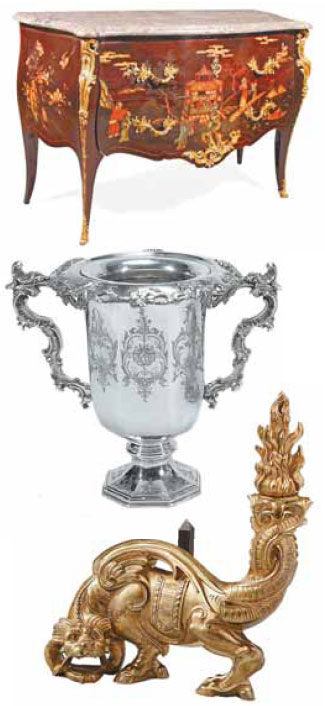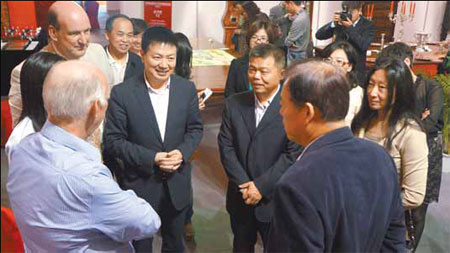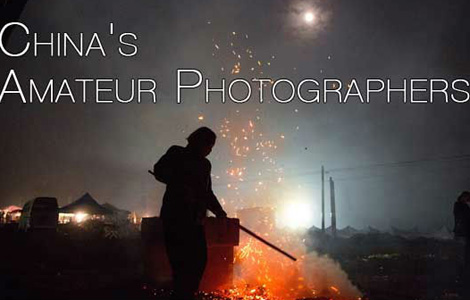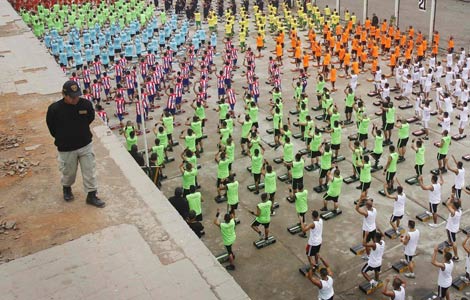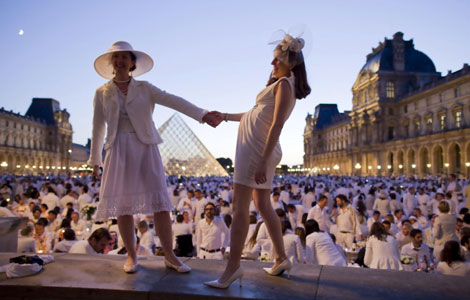Bidding on change
Updated: 2013-06-16 07:37
By Jules Quartly and Sun Li (China Daily)
|
|||||||||||
|
A man takes snapshots at the Beijing China Art International Fair in December last year, when China raked in 30 percent of the world's turnover of art and antiques, beating the US to become the world's No 1 market. Eighty percent of that volume comes from Beijing. Jules Quartly / China Daily |
|
From top: A black lacquer and gilt mounted serpentine commode in the Louis XV style (19th century). A Victorian electroplated octagonal pedestal wine cooler (circa 1870). A Napoleon III gilt bronze chenet (circa 1870). Right: A Napoleon III gilt bronze and white marble mounted striking lyre clock (circa 1870). Photos Provided to China Daily |
|
Gan Xuejun, Huachen Auction's chairman and president, talks with participants and visitors at the international auction in Xiamen. Jules Quartly / China Daily |
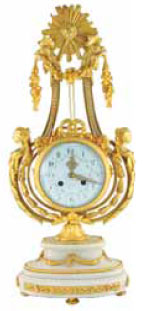
China's first international auction puts on the block the opportunity for the industry to hammer out new national rules. Jules Quartly and Sun Li report.
China's first international auction in Xiamen signifies that curbs on the country's free trade of cultural artifacts may be going, going, gone. Huachen Auctions conducted the sale of 350 lots of Western art, furniture and silverware in Fujian province's free port, promoted by the online auction portal Epai Live and backed by the Association of Accredited Auctioneers (Triple-A), comprised of 21 British auctioneers. The April 21 sale is expected to open the door to more international auctions in China. It was also predicted that further government reform and the opening up of the market will overhaul regulations dating from New China's 1949 founding, preventing the sale abroad of "cultural relics" - which are, broadly speaking, antiques before 1911.
As the world's second largest auction market, after the United States, the Chinese mainland registered more than 47.8 billion yuan ($7.8 billion) in art and antiques sales in 2012, according to the domestic auction-tracking company Artron. For market-tracking company Artprice, it is the world's largest art auction marketplace.
Even so, international auctioneers have been largely locked out of the trade, and there are concerns the market is not as free, transparent and trustworthy as other major international auction environments.
Simply put, this means that while Chinese are busy buying up treasures from abroad, it is not reciprocal - and, even if it were, there would be little confidence in the domestic market because of the amount of fakes washing around.
Speaking before the Xiamen auction, Huachen's chairman and president Gan Xuejun says this situation has to change - and soon.
"I assume that in 10 to 20 years we will have a total free market, meaning that China's cultural relics can be sold overseas. And I do hope this can happen even sooner."
Gan says there were sound reasons at the time for preventing the sale of cultural relics, since they were being looted or sold abroad. But the situation has changed, and many items have either been bought back or even returned.
"The policy of putting restrictions on the export of cultural relics and at the same time allowing for their free import is outdated in the context of the internationalization of the auction market."
Now, Gan argues: "Chinese culture needs to be promoted, and artworks such as relics and antiques are the best medium for this."
While it was a red-letter day for the antiquities trade as a whole at the Xiamen free port sale, it wasn't one for the Penny Black, the world's first adhesive stamp.
None were sold, while coins and artworks, ranging from Andy Warhol pieces to classic canvases, also failed to raise much interest.
However, English silver, clocks and bronze figures found buyers. The most expensive lot was a pair of Louis XVI-style gilt bronze center tables by Francois Linke, which sold for 2 million yuan ($325,390).
Though there was some disappointment at a final tally of 23 percent of lots sold for a total of 9.74 million yuan, Triple-A Chairman Chris Ewbank is bullish, calling it a "sale to test the market and gauge the appetite Chinese collectors have for Western antiques and works of art. We have proved it is possible to achieve such a sale. Now we know what is wanted and what is not."
As for the 150 or so Chinese collectors and buyers who attended, there appeared to be a lot of curiosity to see if the experiment worked and would be continued.
Du Rongrong, a buyer from Beijing, says she intended to buy a few relatively inexpensive items and learn more about the market price of Western furniture.
"I believe the free port auction pattern will be replicated in the future because it is a neat way of sidestepping China's present laws," she says.
Former lawyer and collector Wang Shi, from Jiangxi province's Jingdezhen, says the free-port auction idea was a bright one but did not entirely overcome custom duty issues.
"While I hope China's auction market becomes more open, one of the biggest headaches for collectors is the tax issue, as buyers have to pay duties of up to 27 percent of the price."
He adds that Huachen's reputation and the involvement of Triple-A gave him confidence in the authenticity of the items, which is part of the reason the two partnered at the end of 2012.
The other principal mover behind this collaboration is Jiang Qiqi, CEO of the Beijing-based Epai Live, which she describes as the "Wechat and Taobao of the auction world".
Jiang says the Chinese market has three principal problems - transparency, custom duties and taxes, and trust among buyers.
"What we want to import from Triple-A is the credibility factor and to further build Epai Live into a bilingual system on which foreigners have the confidence to buy and to ensure that payments really are made," Jiang says.
"The world is open to China, but what we see here (in Xiamen) is that China is open to the world. It has to be at the same level."
By following the tried-and-tested formula of partnering with foreign organizations, Huachen and Epai Live intend to percolate foreign practices and expertise.
She says the "buyer beware" principal of Chinese auction houses, which are merely required to say they won't take responsibility for the quality of an item, "has to be changed".
Gan adds: "Some players like to take advantage of the legal loophole, but they don't understand cheating means committing suicide. A fake product will ruin a company's reputation, which should be built to last for years.
"So, we need to learn from our Western counterparts - not about growing into big companies but about playing the game with credibility."
Additional evidence of the macroclimate for domestic auctions' transformation is that the two giants of the international industry are dipping their toes into the market.
Sotheby's has teamed up with Gehua Art Company to take advantage of the planned Beijing free port, while Christie's is set to become the first foreign auction company permitted to operate independently and will hold its first Chinese mainland sale in the autumn.
Gan welcomes them with open arms, saying their entry shows how strong the China auction market is.
"Second, they will introduce professionalism, codes of practice and credit. Third, their presence is a fresh challenge for the country's auctioneers."
He says that, as the first sale by foreigners in China, the Xiamen auction is a first step on a long road.
Naturally, he also believes a Chinese auctioneer will likely become a major player in the international industry.
As for Huachen, he insists: "The ambition is not about building the biggest company but about making it the last one standing."
(China Daily 06/16/2013 page1)
Today's Top News
China condemns attack on students in France
Obama, Putin face tough talks at G8 summit
Czech PM steps down amid scandal
Policies to boost cross-Straits ties
Courts feel trials of global economy
Attack on Chinese sparks fears
Experts puzzled by state of economy
Exchanges key to promoting TCM
Hot Topics
Lunar probe , China growth forecasts, Emission rules get tougher, China seen through 'colored lens', International board,
Editor's Picks

|

|

|

|

|
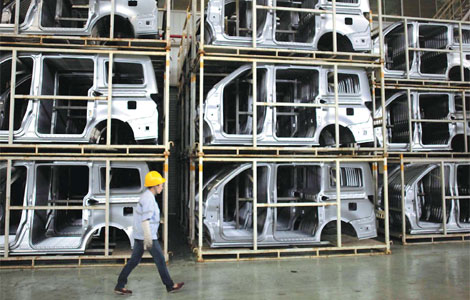
|
